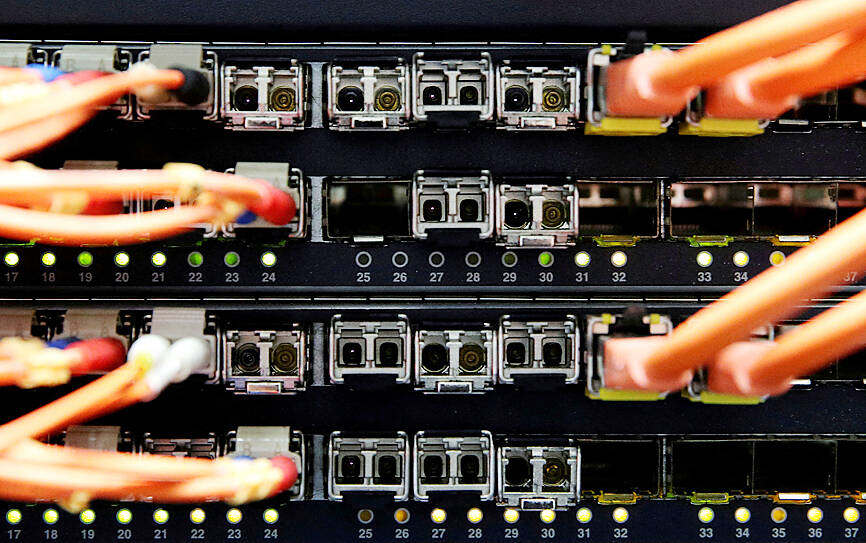The Executive Yuan yesterday passed a four-year, NT$1.34 billion (US$41.86 million) plan to reinforce the nation’s digital resilience.
The Ministry of Digital Affairs said that the government’s digital resilience project would reinforce fixed telecommunications networks to process encrypted data on public cloud servers during peacetime, and use satellites and mobile communication networks to access critical core functions on the public cloud.
Premier Chen Chien-jen (陳建仁) told a meeting of the Executive Yuan that the project would help realize President Tsai Ing-wen’s (蔡英文) goal to build a more resilient nation, which she first promised in her Double Ten National Day address last year.

Photo: Reuters
The project would utilize cross-sector public cloud computing to encrypt and back up information generated by 18 critical civilian systems, forming a vital core that would allow the government to maintain essential digital services in an emergency, Chen said.
The project would also hasten the government’s return to functionality in the event of a disaster, he said.
Taiwan is racing against time, as global affairs are changing by the second, he said, adding that ministries should prioritize transfers of critical civilian systems to the cloud.
The digital ministry should provide assistance and programs for local governments and ministries to train sufficient personnel with the skills to enhance Taiwan’s digital resilience, Chen said.
Separately, Deputy Minister of Digital Affairs Chiueh Her-ming (闕河鳴) said that the ministry wants to keep some systems — such as those utilized by the National Health Insurance, the Ministry of Transportation and Communications’ vehicle management system and the Ministry of the Interior’s border control systems — running in the event of natural disasters.
The digital ministry encrypts and stores data in “blocks” separately on public-domain cloud servers, Chiueh said, adding that the system is “mathematically sound,” although information security cannot be 100 percent.
This method ensures that even if individuals were to somehow obtain part of the information, it would be meaningless, he said.
The decision to implement the system was made with the evolution of cryptography in mind and that the system is a low-risk way to store information, he added.
Additional reporting by CNA

NATIONAL SECURITY THREAT: An official said that Guan Guan’s comments had gone beyond the threshold of free speech, as she advocated for the destruction of the ROC China-born media influencer Guan Guan’s (關關) residency permit has been revoked for repeatedly posting pro-China content that threatens national security, the National Immigration Agency said yesterday. Guan Guan has said many controversial things in her videos posted to Douyin (抖音), including “the red flag will soon be painted all over Taiwan” and “Taiwan is an inseparable part of China,” while expressing hope for expedited “reunification.” The agency received multiple reports alleging that Guan Guan had advocated for armed reunification last year. After investigating, the agency last month issued a notice requiring her to appear and account for her actions. Guan Guan appeared as required,

Japan and the Philippines yesterday signed a defense pact that would allow the tax-free provision of ammunition, fuel, food and other necessities when their forces stage joint training to boost deterrence against China’s growing aggression in the region and to bolster their preparation for natural disasters. Japan has faced increasing political, trade and security tensions with China, which was angered by Japanese Prime Minister Sanae Takaichi’s remark that a Chinese attack on Taiwan would be a survival-threatening situation for Japan, triggering a military response. Japan and the Philippines have also had separate territorial conflicts with Beijing in the East and South China

A strong cold air mass is expected to arrive tonight, bringing a change in weather and a drop in temperature, the Central Weather Administration (CWA) said. The coldest time would be early on Thursday morning, with temperatures in some areas dipping as low as 8°C, it said. Daytime highs yesterday were 22°C to 24°C in northern and eastern Taiwan, and about 25°C to 28°C in the central and southern regions, it said. However, nighttime lows would dip to about 15°C to 16°C in central and northern Taiwan as well as the northeast, and 17°C to 19°C elsewhere, it said. Tropical Storm Nokaen, currently

PAPERS, PLEASE: The gang exploited the high value of the passports, selling them at inflated prices to Chinese buyers, who would treat them as ‘invisibility cloaks’ The Yilan District Court has handed four members of a syndicate prison terms ranging from one year and two months to two years and two months for their involvement in a scheme to purchase Taiwanese passports and resell them abroad at a massive markup. A Chinese human smuggling syndicate purchased Taiwanese passports through local criminal networks, exploiting the passports’ visa-free travel privileges to turn a profit of more than 20 times the original price, the court said. Such criminal organizations enable people to impersonate Taiwanese when entering and exiting Taiwan and other countries, undermining social order and the credibility of the nation’s